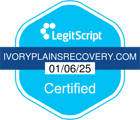Although the concept of outlining goals might seem like something people only do in business environments, we have a lot to gain from this practice personally as well. If you’re adapting to more of a growth mindset in recovery and recognizing just how rewarding your life can be, setting meaningful, actionable goals helps you design a better future on your terms.
What the Research Says About Meaningful, Actionable Goals
There’s an important balance to meet when creating goals. On one hand, you want to dream big, and why not, right? On the other hand, if your goals are too lofty from the start without a deliberate course of action to follow, there’s the potential you won’t achieve things as you envision them, perhaps weakening your motivation to try again.
This sometimes happens in addiction recovery. After completing the first 30 days of rehabilitation—a monumental achievement—individuals without key goals and intentions might feel they don’t have a clear direction. But recovery success stories are filled with ideas and inspiration that demonstrate how the proverbial one step at a time matters when planning for the future and how you’re going to achieve what matters to you.
In this article, Inc. reported that creating goals activates your brain in interesting ways. Citing a study from the University of Texas, researchers discovered the following, which we provide verbatim:
- The part of your brain that creates emotion, your amygdala, evaluates the degree to which the goal is important to you.
- The part of your brain that does problem solving, your frontal lobe, defines the specifics of what the goal entails.
- The amygdala and frontal lobe work together to keep you focused on, and moving toward, situations and behaviors that lead to the achievement of that goal, while simultaneously causing you to ignore and avoid situations and behaviors that don’t.
Results of a 2021 study published in the Journal of Substance Use and Addiction Treatment indicated that goal-directed therapeutic work in recovery allows for “a collaborative means of mapping and tracking a course of mutually accountable treatment.” Researchers examined various practices, including goal setting and goal monitoring, as well as a person’s self-determination, motivation, and self-efficacy.
The University of Iowa studied the impact of goals for “students with or at risk of emotional and behavioral disorders.” Preliminary results suggested that goals can be an essential tool for self-regulation, which in turn helps “improve both academic and behavioral outcomes.”
These are just a few examples of how incremental goals can improve your life. Here’s how to get started.
Setting Meaningful, Actionable Goals
The strategy of goal setting hinges on what Michigan State University (MSU) calls an “evidence-based approach: to achieve goals, write them down, make a plan, and solicit support from a friend.” In a study conducted by Gail Matthews, an MSU psychology professor, results indicated that:
- “76 percent of participants who wrote down their goals, actions, and provided weekly progress to a friend successfully achieved their goals.”
- “This result is 33 percent higher than those participants with unwritten goals, with a success rate of only 43 percent of goals achieved.”
Search “how to set goals” and usually the first thing to pop up is the acronym SMART, a plan of action which generally stands for:
- Specific
- Measurable
- Achievable
- Relevant
- Timebound
Let’s break this down further with help from the Substance Abuse and Mental Health Services Administration (SAMHSA). In this fact sheet, the organization states that SMART goals actually have two parts:
- “Goals are the specific result or purpose expected from the project. The project goals specify what will be accomplished over the entire project period and should directly relate to the problem statement and vision. The goal is achieved through the project objectives and activities.”
- “Objectives are the specific steps that lead to the successful completion of the project goals. Completion of objectives result in specific, measurable outcomes that directly contribute to the achievement of the project goals.”
So here’s how you might outline your personal SMART goals:
- Specific. Clearly define what you want to achieve, and be precise. For example, instead of a vague goal like “exercise more,” make it specific, such as “I will walk for 30 minutes every day.”
- Measurable. Establish criteria to evaluate your progress and determine when the goal is achieved. So, you might use a fitness tracker to record daily walking time.
- Achievable. Consider your resources, time, and abilities and ensure your goal is realistic and attainable. This allows you to sustain enthusiasm, add to your motivation, and benefit from incremental progress, such as starting with a 15-minute walk and gradually increasing to 30 minutes.
- Relevant. A meaningful goal is one that aligns with your values and overall objectives. Identify why your goal matters to you and write down those objectives as well, like “I want to improve my overall health and wellbeing, so I will walk each day.”
- Timebound. Creating a goal timeframe helps accountability by establishing a sense of urgency and helping you stay focused. Using all the SMART principles above, you might say “I will walk 30 minutes every day for the next three months.”
Also plan to regularly review and adjust your goals based on your progress. If necessary, modify them to ensure they remain challenging yet achievable. Additionally, breaking larger goals into smaller, manageable tasks as demonstrated above makes the process more manageable and increases your chances of success.
Discover Your Potential at Ivory Plains
The philosophy of our addiction rehabilitation program in Adair, Iowa is to offer you a safe, supportive setting and board-certified professionals to help you explore not only your needs of the present, but also the opportunities of the future. This approach helps set you up for success. Talk with our admissions team if you’re ready to make sober living your top goal.








